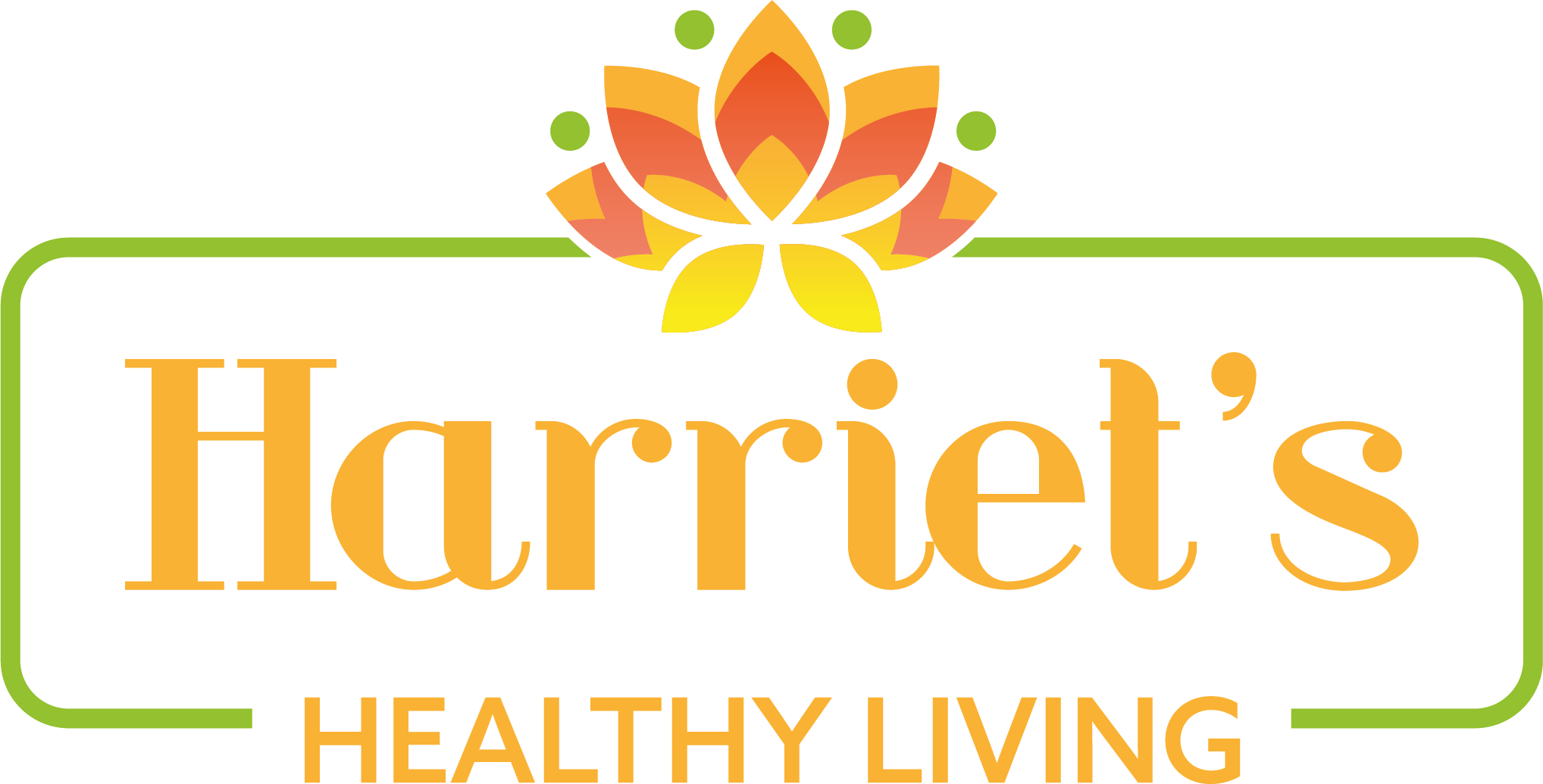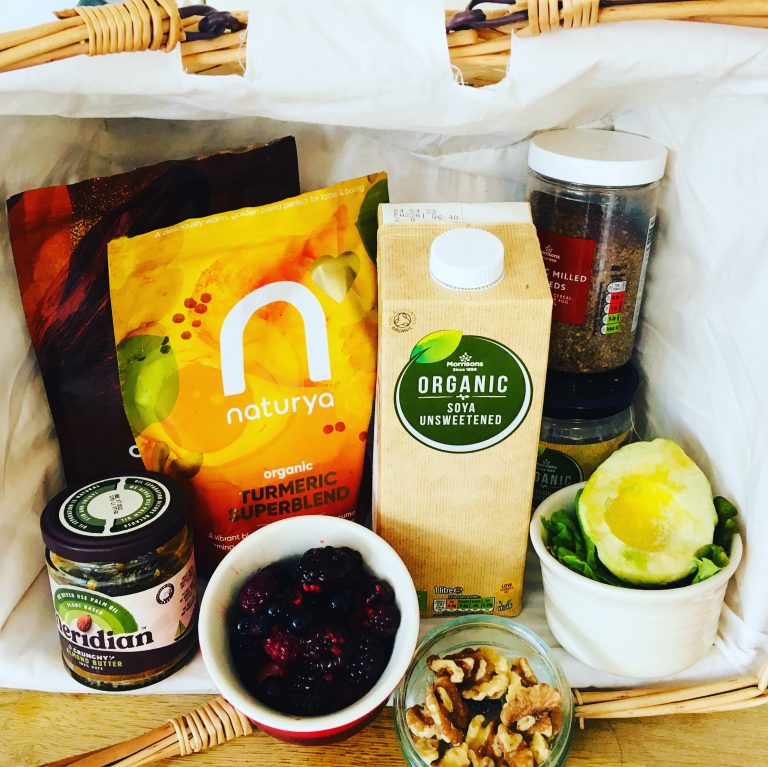This week, my friend Amanda and I hosted our 3rd ‘Women’s Health Call’ over zoom. The aim is to bring women together to share stories and learn from each other.
So, this month I decided to share my shopping basket as a fun conversation starter.
It’s an interesting one, because despite believing wholeheartedly that a good diet is essential to good health, I guess these days I don’t really over- think it!
There was a time when I was really driven to create a cafe full of recipes that were ‘good for this, that and the other’… but these days I try and keep things much simpler and just focus on eating real food with real ingredients… You see a varied plate of real food inevitably contains a whole variety of micro- nutrients (vitamins and minerals ) and macro nutrients (protein, complex carbs, essential fats), and this is what always guides my recipe choices…
I have always promoted an anti- inflammatory, blood sugar balancing diet for good health.
A menopause diet is no different, but I would argue that perhaps being more mindful of these things is even more important during this time!
It was fascinating preparing for this session, as it was a real demonstration to me of how we are always learning & growing. I actually hosted a menopause event 5 years ago when I was volunteering at a local community café. However, the information I shared this time was considerably different to what I shared then!
At that point in time I focused on promoting specific phytoestrogen rich foods such as organic soya, miso, and tofu, as these are common foods eaten in Japan where they don’t even have a word for the menopause!
However, ironically after that event, despite eating these foods and exercising regularly, I felt far from a shining example of menopausal health, and I struggled for several years from several of the negative symptoms such as insomnia, low confidence and anxiety.
So, these days after several years of learning later, I have stepped away from this rather reductionist approach to a much broader holistic approach to health and a more ‘whole body’ approach.
Don’t get me wrong these foods do have beneficial properties but their effect is limited if we don’t also take a much broader approach…
Obviously, movement, relaxation and sleep are also a big part of the broader picture, but for the focus for this session was food. However even with food it is important that we look at this from a broad ‘whole body’ approach.
Good nutrition is essential for all the systems and organs of the body
What’s important to understand is that the peri menopause and menopause is a time of huge physiological shift that effects several different organs and systems in our body. Oestrogen and progesterone do not only support the function of the reproductive system, but they also contribute to the healthy function of many other systems including the brain, nervous system, immune system, the heart, and the muscular skeletal system. Our whole body needs to adapt to the reduction in hormone levels, so eating a nutrient rich diet is crucial during this time.
It sounds complicated. However, if you eat a varied wholefood diet, full of real unprocessed food, you will naturally be eating all the essential nutrients that you need.
The best diet is the one you will eat
With my ‘health coach’ hat on these days I also know so clearly that we will only sustain habits if they are simple, easy, and enjoyable. The best diet is after all is the one that we will eat. So I think it is much more important to talk about the ‘food groups’ rather than specific foods so that people can choose the foods that are enjoyable to them, because even with the best will in the world, people will only ever eat foods they enjoy in the long term, and it is these consistent long term healthy habits that create real long term health…..
Just start with fruit & veg… Over the years people have asked me ‘What is the best thing I could do to improve my diet?’ and it will always be ‘Eat more fruit and veg.’ A rainbow of fruit and veg provide a variety of essential vitamins, minerals, and fibre which is crucial for health. However, they are also rich in phytochemicals that are so crucial for reducing inflammation in the body…
Eat an anti- Inflammatory diet
Inflammation is the biggest cause of chronic disease. We will all be familiar with the inflammatory response such as the redness and swelling that occurs when you cut yourself, and this type of short- term inflammation is a brilliant healing system
However, our lifestyle choices can also cause an inflammatory response, including a diet high in sugar, dairy, unhealthy fats, and alcohol, and exposure to chronic stress, poor sleep, and environmental toxins.
Again, our body is able to deal with short term inflammation, but it is not meant to deal with long term chronic inflammation, so if people consistently making poor lifestyle choices, they will be susceptible to chronic inflammation and the consequence of this unfortunately chronic disease.
So, when it comes to diet, inflammation can be both exacerbated by, and reduced by our diet, depending on our food choices, and without doubt the most powerful anti-inflammatory foods are fruit and veg. The more inflammation there is going on in the body, the more fruit and veg we need to eat to compensate…. eating more fruit and veg can help to tip the balance back in your favour…
So, choosing an anti-inflammatory diet is always important but especially in the perimenopause & menopause. Inflammation can disrupt every system in the body including the function of our hormones, so it can make any negative symptoms of the menopause worse. It can switch on the stress response and disrupt mood and sleep. It can make periods heavier, and it can worsen insulin resistance, and contribute to menopausal weight gain.
A word about fibre
As well as brimming with nutrients, fruit & vegetables are also rich in fibre. This is vital to the health of our gut, and for the elimination of toxins, and excess hormones. It is also key for establishing a diverse range of gut bacteria. This is key to health, including regulating our immune system and reducing inflammation.
Eat a blood-sugar balancing diet
Sugar is perhaps the most detrimental thing we can eat for our health. Excess sugar consumption causes an inflammatory response and can lead to insulin resistance. Insulin is crucial hormone that manages our blood sugar levels. However consistent high sugar consumption can lead to insulin resistance where our body is no longer able to produce insulin or when the cells become insensitive to it. This can disrupt the function of many other systems and organs in the body and predispose us to a whole host of other health conditions, including type 2 diabetes.
Insulin resistance is also a driver of inflammation. The combination of insulin resistance and inflammation can cause several menopausal symptoms including abdominal weight gain, memory loss, high cholesterol, increased risk of osteoporosis, heart disease and dementia, hot flushes and fibroids. The menopause itself also makes women much more susceptible to insulin resistance because low levels of oestrogen and progesterone can contribute to a change in insulin sensitivity.
Fortunately, again our food choices are key to preventing or reversing insulin resistance, and this is where eating a balanced diet (containing all the essential food groups) is key! Fibre, protein and healthy fats all slow down the digestion of food and prevent the rapid release of glucose into the bloodstream… so it is important that we eat a plate that contains a balance of all these essential food groups.
So, what was in the shopping basket…
So, during the call I invited people to guess what was in my shopping basket…
Coincidentally, my organic Veg box had arrived the morning of our call… I would wholeheartedly recommend signing up to any organic or local veg scheme. I have down this for years, and it really helps me to eat a varied diet! It is so easy to fall into the trap of buying the same veg week after week if we buy our veg from the supermarket.
Aside from veg, my shopping basket contained fibre rich: wholegrain oats, brown rice, and quinoa, protein rich: beans, lentils, quinoa, nuts, eggs, and tinned mackerel, and healthy fats from: olive oil, avocados, nuts, seeds, (and mackerel).
Although not strictly in my shopping basket, we also discussed the importance of drinking plenty of water! Water is vital for energy production, for reducing inflammation, detoxification, metabolism, and lubricating the joints… among other things!
So if you would like any help next time you are writing your shopping list just remember to include a variety of anti-inflammatory fruit and vegetables, and a balance of a blood sugar stabilising, real protein ,complex (fibre rich) carbohydrates, and healthy fats. It really isn’t complicated. It’s just real food!
It’s always a good idea to start small when you are building new healthy habits and what better way to start than with your breakfast! Most mornings I will have a smoothie as there is just so much you can pack in it…. I have included the recipe underneath in case you wanted to try it!
Breakfast smoothie
200ml plant milk (I use organic soya milk)
1 handful of frozen berries
Half an avocado
1 tbsp cacao powder
½ banana for sweetness (optional)
Handful of greens (spinach or kale)
1 tbsp almond butter (or other nut butter)
1 tbsp coconut oil
1 tsp turmeric powder blend (optional)
1 tbsp ground linseed
I eat this with a spoon and tend to top with chopped nuts and cacao nibs, or homemade granola, for added protein and texture.
I hope you feel inspired to try it.
Smoothies might not be everyone’s choice, but hopefully now you will be thinking how you might squeeze some fruit or vegetables in and will be mindful to include that balance of protein, fibre, and healthy fats….
I hope this has been helpful! As a health coach a key part of my role is to provide simple accessible information for people. However, if you would like more detailed information, I would really recommend a brilliant book: ‘Hormone Repair Manual’ by Lara Briden.
If you would like any support to putting any of this healthy inspiration into action I would be delighted to help you. Please do get in touch if you would like any information on my 4 week ‘Find the Pause in the Menopause’ program starting in June. The program is also available as a 1:1 coaching program if you prefer.
Please get in touch to find out more or feel free to book a gifted 1:1 session here.
In the meantime, thankyou for reading.
Please take good care of yourself, and I hope to see you soon,
Harriet x

